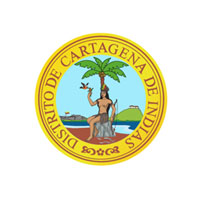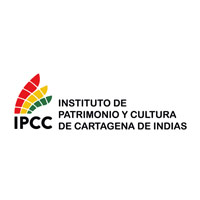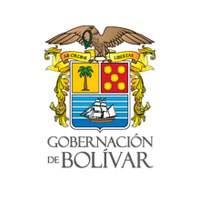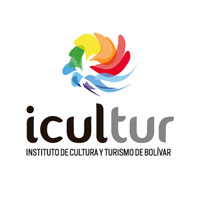Hay Festival Joven
Hay Joven is the Hay Festival branch exclusively aimed at the University community, thanks to the joint work between Hay Festival and the Mexico City campus of Tec de Monterrey university. All events are free to enter, you just need to register for the events.
Event HJ1
Vanessa Rosales in conversation with Carolina Echávez
Mujer incómoda
Universidad de Cartagena - Paraninfo Rafael Núñez
Read moreCarolina Echávez talked to a Cartagena writer and thinker whose work is sparking conversation and even change. Vanessa Rosales studied History at the University of the Andes, took a Master’s in Journalism at the Argentinean newspaper La Nación and a Master’s in Fashion Studies at the New School for Design in New York. She is the author of the book Mujeres vestidas: Moda consciente (2017), a work about the history of fashion and its relationship to the changing ways in which the feminine, identity, liberty and struggle have been imagined. Her latest book is Mujer incómoda (2021), a collection of personal essays about themes that matter to her as a woman: feminism, aesthetics, love, religion, her native land, intimacy…
Event HJ2
Ana González Rojas and Irene Reyes Noguerol in conversation with Marta Nebot
Bridges between memory and oblivion through literature
Universidad de Cartagena - Paraninfo Rafael Núñez
Read moreEvent HJ3
María Jimena Duzán in conversation with Rafael Molano
Los patrones de la guerra
Universidad de Cartagena - Paraninfo Rafael Núñez
Read moreThe Colombian journalist and political scientist María Jimena Duzán shares the creative process behind her documentary series Los patrones de la guerra, a journey through the land and the recent history of Colombia, in which the audience discovers the main factors that prolonged and degraded war in Colombia. She has worked for some of the most important media organizations in the country, such as El Espectador, El Tiempo and Semana magazine, and she has written for several international media sites. She has written investigative journalism books, such as Mi viaje al infierno (2010), a chilling testimony of the murder of her sister at hands of a paramilitary group in Colombia. She is currently a columnist for El País newspaper, she has her own YouTube channel and in September 2021 she launched the podcast A Fondo on Spotify, where she approaches Colombia’s social and political reality. Her most recent book is Para qué escribir (2020). In conversation with Rafael Molano.
Supported by ICTJ - International Centre for Transitional Justice
Event HJ4
Raquel Martínez-Gómez
Writing workshop. Young people and the scourge of inequality
Universidad de Cartagena - Paraninfo Rafael Núñez
Read moreRaquel Martínez-Gómez (Spain) offered a writing workshop for young people from Cartagena who want to tell the stories of their lives, putting an emphasis on how an inequality of opportunities and a lack of human rights guarantees have affected their lives. The workshop provided basic tools to do this and the goal is to create a publication that will offer a compilation of the different stories. All the work was be done using a collaborative methodology, accompanied by the writer Raquel Martínez-Gómez. The stories build images with words that identify the consequences of the different inequalities and how these combine. During the pandemic, the mental health of young people deteriorated and the habit of writing can be a healing one. An increase in gender violence has been another of the worrying aspects of the Covid crisis. At this workshop, young people shared their stories in order to understand that the lack of care that many young people suffer from has causes and that it is important to tackle solutions together.
With the support of Acción Cultural Española, AC/E
Event HJ5
Carlos López-Otín in conversation with Josefina Zakzuk, moderated by José Vicente Guzmán Mendoza
The trilogy of life
Universidad de Cartagena - Paraninfo Rafael Núñez
Read moreWith the support of Acción Cultural Española, AC/E
Event HJ6
Júlia Barceló
Operación Bikini
Universidad de Cartagena - Paraninfo Rafael Núñez
Read moreStarting from the reading of some excerpts from the illustrated book Operación Bikini, Julia Barceló worked on concepts such as aesthetic pressure or dieting culture using humour and personal experience. The goal of the workshop-talk consisted in delving into the structural pressure that beauty canons imply, the problems that they bring and how we can fight them in real life as well as on social media. It is important to find tools to educate a kinder way of looking at other people's bodies as well as our own, to improve our coexistence and empower ourselves in regard to this.
With the support of Acción Cultural Española, AC/E

Event HJ8
Radio Workshop with Gemma Cairney
Universidad de Cartagena - Paraninfo Rafael Núñez
Read moreAward-winning journalist and writer Gemma Cariney (United Kingdom), who currently works for the BBC, presents a workshop on radio, podcasts and audiobooks to learn about the power of sound to tell stories and express ourselves. How can young people use their voice to share their potential? The workshop explored the history of radio transmissions, analyzing the innovations that this format has incorporated, and thinking about new ways to tell stories.
With the support of British Council

Event HJ9
Carlos Granés in conversation with Adolfo Meisel-Roca and Antonio Celia
Auditorio Marvel Moreno, Universidad del Norte, Barranquilla
Read moreCarlos Granés (Bogotá) is an essayist and PhD in Social Anthropology from the Complutense University of Madrid. Delirio americano: Una historia cultural y política de América Latina (2021) is his new work and he talked about it with Adolfo Meisel-Roca, economic historian and rector of the Universidad del Norte, and Antonio Celia, director of the Centro de Arte y Cultura Cayena. Following a timeline from the death of José Martí to the death of Fidel Castro, the book analyses the many cultural, political and ideological currents that have contributed to the invention of modern Latin America, from modernism and the Americanist avant-garde to political and cultural guerrillas, to end up examining the most immediate present and the unexpected way in which the politics and culture of Latin America has ended up influencing the whole world.
With the support of Acción Cultural Española, AC/E and Universidad del Norte
Event HJ10
Anne Boyer in conversation with Luz Karime Santodomingo and Daniela Pabón
Auditorio Marvel Moreno, Universidad del Norte, Barranquilla
Read moreAmong the many perversions of our current socioeconomic system is the fact that not only is access to health increasingly the privilege of a few but there is an entire health industry organized around profit at the expense of the suffering of those afflicted by often serious diseases. The poet, essayist and lecturer Anne Boyer (United States) won the Pulitzer Prize for Nonfiction for The Undying in 2020. In this reflection on disease in a pitiless capitalist world, she tells the story of her own experience as a survivor of an aggressive breast cancer that led her to reflect and understand these chilling realities first hand. Boyer is also the author of books such as The Romance of Happy Workers (2008), The 2000s (2009), Garments Against Women (2015) and A Handbook of Disappointed Fate (2018). In conversation with Luz Karime Santodomingo, magister in liberal studies and teacher in the Spanish department of Universidad del Norte, and Daniela Pabón, philosopher and teacher at Universidad del Norte.
With the support of Universidad del Norte
Event HJ11
Carlos López-Otín in conversation with Hernando Baquero and María del Pilar Garavito
Auditorio Marvel Moreno, Universidad del Norte, Barranquilla
Read moreCarlos López-Otín (Spain) is an award-winning Professor of Biochemistry and Molecular Biology at the University of Oviedo. He is an authority on the subject of cancer and aging thanks to his advanced studies into human genetics, and also the discoverer of more than 60 new genes, as well as of two accelerated aging syndromes and pro-longevity bacteria. His books La vida en cuatro letras (2019), El sueño del tiempo (2020) and Egoístas, inmortales y viajeras (2021) constitute his brilliant trilogy of life, in which he covers questions with both biological and philosophical perspectives including the relationship between genetics, disease and happiness; time, biology and technology; and the nature of a disease as complex as cancer. Carlos López-Otín shared his fascinating vision in conversation with Hernando Baquero, pediatrician and dean of the Department of Health Sciences at Universidad del Norte, and María del Pilar Garavito, geneticist and teacher at Universidad del Norte.
With the support of Acción Cultural Española, AC/E and Universidad del Norte
Partner for Latin America

Principal Sponsors
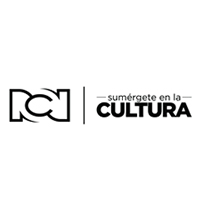

Government Partner
